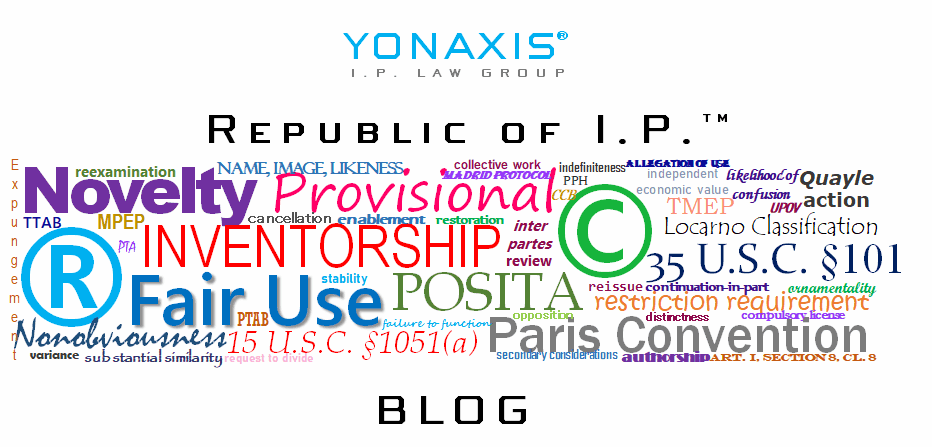Patent, copyright, and trademark are the three most common and well-known IPs. However, there are many other IPs. Three types of IPs protecting new plant varieties, or plant breeder’s rights, are utility patents, plant patents under 35 U.S.C. §161, and plant variety protection certificates under 7 U.S.C. §2321. Utility patents are issued for new plant …
Author: Yonaxis
CannabIP: U.S. Patent No. 10,279,000 B1
U.S. Patent No. 10,279,000 B1 (‘000) issued on May 7, 2019, for “Method for Treating Cannabis Induced Anxiety.” It was issued to inventor Mark Hetherington, of Saskatoon, Canada and Jason Green, of Birch Hills, Canada. The applicantassignee is Canopy Growth Corporation, of Smith Falls, Canada. The specification discloses several embodiments focused around treatment of anxiety …
Garage Door Tech Not Patent-Eligible
On August 21, 2019, the Court of Appeals for the Federal Circuit held in The Chamberlain Group, Inc. v. Techtronic Inds. Co.,[1] that Chamberlain’s U.S. Patent No. 7,224,275 (‘275) directed to wireless communications technology for operating a movable barrier (i.e., garage door opener) was patent-ineligible subject matter under 35 U.S.C. §101. The ‘275 patent is …
NIST Seeking Comments on CRISPR Lexicon
On September 18, 2019, the National Institute of Standards and Technology (NIST)’s Genome Editing Consortium (GEC) formally sought comments on genome editing, commonly called CRISPR, terminology in order to develop a standardized system of terms and definitions for the CRISPR research community. This is the first time the NIST has made overtures to develop a …
Fed Circuit Watch: Claim Construction Before Patent-Eligibility Analysis
There have been several patent-eligibility rulings by the Court of Appeals for the Federal Circuit this year, but on August 16, 2019, the Fed Circuit held that claim construction in-dispute must be resolved before patent-eligibility under 35 U.S.C. §101 can be analyzed, in MyMail, Ltd. v. ooVoo, LLC.[1] The somewhat circuitous procedural aspects of this …
CannabIP: U.S. Patent No. 10,258,601 B1
U.S. Patent No. 10,258,601 B1 (‘601) issued on April 16, 2019, for “Vaporizable Cannabinoid Compositions.” It was issued to applicant/inventor Stephen C. Perry, of Norwood, Massachusetts. The specification discloses the composition of the vaporizable cannabis solution disclosed as comprising various Markush groups, including different formulations of the Cannabis plant, cannabinoids, bioactive ingredients, cannabinomimetics, and fatty …
Fed Circuit Watch: Valuable Contribution Is Not Necessarily Patent-Eligible
In a strange ruling by the Court of Appeals for the Federal Circuit, on July 29, 2019, although publicly released on August 9, 2019, in Genetic Veterinary Scis., Inc. v. Laboklin GmbH & Co KG,[1] the Fed Circuit found that in spite of the claimed invention’s “valuable contribution” to the veterinary sciences, it remained outside …
CannabIP: U.S. Patent No. PP30,668 P3
U.S. Patent No. PP30,668 P3 (‘668) issued on July 9, 2019, for “Cannabis Plant Named ‘DD-CT-BR5’.” It was issued to inventor David Holmes of San Gabriel, California. The applicant/assignee is Cannagen, LLC, of San Gabriel, California. This patent is a plant patent under 35 U.S.C. §161, which protects new and distinct cultivars of plants. According …
Fed Circuit Watch: IPRs Not Unconstitutional Taking Under Fifth Amendment
Many cases have been heard before the Court of Appeals for the Federal Circuit dealing with substantive patent issues, like questions involving anticipation under 35 U.S.C. §102, obviousness under 35 U.S.C §103, or patent-eligible subject matter under 35 U.S.C. §101. Constitutional issues have been rare, with the exception of Oil States which questioned the constitutionality …
TechPat: Former Uber Self-Driving Leader Indicted for Trade Secrets Theft
The United States Attorney’s office in San Jose, California, recently indicted Uber Technologies, Inc.’s former autonomous driving car guru, Anthony Levandowski, with thirty-three counts of trade secrets theft in violation of 18 U.S.C. §§1832(a)-(d). The indictment was only released on August 27, 2019, after being unsealed by the federal district court judge presiding over the …
